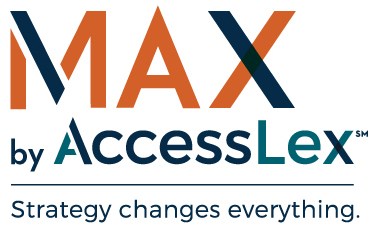Financial Wellness
We know that dealing with your financial life on top of being a law student can seem overwhelming and stressful at times. This is for all of our students and not just as it relates to those who are taking out loans. We take seriously our responsibility to prepare you for a successful professional future and while you are here, we also want you to be fully supported and prepared in the area of personal finance as well. While we don't claim to be financial planners, we are committed to providing information and tools to assist all of our students in managing finances.
Hopefully, some of the information in this section will reduce some of the stresses that result from common frustrations and problems, or spark an idea to keep on top of your finances.
MAX by AccessLex
-
Meet Max
We are excited to announce that Detroit Mercy Law is partnered with
 AccessLex to offer a financial wellness program designed by law students for law students that will prove to be extremely helpful to you. MAX offers personal finance information through online webinars, a podcast, on-campus programs, and individual counseling. MAX offers you the best-in-class personal finance resources at no cost to you.
AccessLex to offer a financial wellness program designed by law students for law students that will prove to be extremely helpful to you. MAX offers personal finance information through online webinars, a podcast, on-campus programs, and individual counseling. MAX offers you the best-in-class personal finance resources at no cost to you.To provide a comprehensive personal finance education, the MAX program:
- Teaches personal finance in a way that leverages the skills law school attracts and fosters;
- Takes a multi-format approach – including interactive online lessons, webinars, in-person workshops and one-on-one counseling – that lets you define your own path;
- Delivers information in quick and easy to understand components to fit into your demanding schedule; and
- Offers scholarship incentives to motivate you to stay on task and on schedule – AccessLex will award over $330,000* through MAX Scholarship drawings during the 2020-21 academic year!
To Get started: Go to Ask EDNA AccessLex. Your name, email address, school, and class year are all you need to log-in to the program, personalize your experience, and track your progress. No other personal information is required, and all information remains confidential.
-
Why Max?
“How will MAX benefit me?” Over the next few years, you will face very important financial decisions. And, even now, you may be faced with questions about student debt and repayment options. 70% of law students say they feel stressed about personal finances. Reduce your stress level by increasing your financial knowledge. MAX can help you.
“OK. Sounds great. But how much time will it take?” Each online lesson takes approximately 15 minutes to complete. And, we would like you to complete your lessons during the summer when you have more time.
“How do I get started?” Simply go to https://www.accesslex.org/maxonline via your computer, tablet, desktop, or smartphone.to get more information and the steps on how to sign up
“What else does MAX provide?” Supplementing MAX online lessons will be webinars and podcasts, a monthly newsletter, and MAX Coaching – your personal access to one-on-one financial coaching with accredited financial counselors. And, there are the scholarship opportunities. AccessLex will be giving away $330,000 in scholarships to MAX participants during the academic year ($110,000 per each class 1Ls, 2Ls, and 3Ls at MAX schools). Create your MAX account and earn chances to win a scholarship by completing the online lessons and 1L survey and by attending webinars. Check out all the scholarship winners here. This academic year, it could be YOU!
“Why does Detroit Mercy Law participate in the MAX program?” We take seriously our responsibility to prepare you for a successful professional future and, while you are here at Detroit Mercy Law, we also want you to be fully supported and prepared in the area of personal finance as well. Now is the perfect time to build a firm foundation of understanding of your own personal finances! Graduating from law school with a strong framework for making good financial decisions will be extremely beneficial and will have a positive impact on every aspect of your personal and professional financial future.
-
Upcoming Events
AccessLex hosts webinars and events every week that are open for all law students and legal professionals. You can find an updated list of upcoming webinars and events on their website. But they also host events just for students from Detroit Mercy Law.
Financial Resources
-
Budgeting 101 During Law School
Being fiscally responsible during law school reaps rewards later on in life. We encourage students to complete a yearly personal budget to help evaluate their costs. Using a budget will help you form good spending habits now to keep you from overspending later on.
After completing your budget, you may realize you need to reduce some of your spending and that may seem impossible. However, if you cannot learn to live on less, long-term financial goals will become harder to achieve. To live below your means may require some hard choices. It could mean living with a roommate instead of getting your own apartment (even after you graduate). You may have to sacrifice some travel opportunities or hold off on some purchases until you’ve saved money. It may not sound glamorous or sexy—but neither is thousands of dollars in credit card debt.
-
Budgeting Steps
Here are some easy steps to being more financially wise:
Step 1 - Track Your Spending. Keep a record of your spending for a couple of months, especially the months before law school starts. It will feel difficult, tedious, and boring, but it's important to see where your money is going. One way to make the tracking easier is to use an app that links your credit cards and bank accounts so that you can see in real-time how you spend.
Step 2 - Create a Budget. You don't have to use a specific budget outline, just create one. Your initial budget is just a best guess of what you think you will spend over the next year. An app might be better for you and there are plenty of free ones out there. Here are a few:
Step 3 - Review Your Budget. If you have a budget you've been using, take a look at it again. Then about it halfway through the year, take a look at your budget again and see how things have changed. You can modify your budget and modify your spending.
Step 4 - Actually Save. Saving a few dollars every month is still saving. Put your change in a jar every day. Transfer money from your checking to your savings; if you don't see it you might not spend it. Saving shouldn't hurt; it should feel hopeful. This is really important so that when it comes to the bar study period, you aren't stressing out about your finances but you can dedicate your focus to studying for the bar exam as a full-time job. Plus, you'll have created great practices that will lead to saving in the future.
-
Budgeting Tips
Below are a few tips to help you budget while in school:
- Shop at places that have student discounts. Make sure to have your student ID with you all the time.
- If you are using student loans for indirect expenses when you make a purchase remember the interest rates on your student loans; what you are purchasing will cost more in the long run.
- Reuse and restyle clothing instead of making new purchases. If the clothes don't fit anymore, try doing a clothing exchange with friends and peers.
- Invest in a good travel mug and make your first coffee/tea/smoothie at home every day before heading to class or before sitting down at your computer.
- When grocery shopping, don't forget your list AND your coupons. Most grocery stores do electronic coupons now; just download the app. If the grocery store has a FREE rewards program, sign up for it but don't fall for the need to buy in excess just to get the deals.
- Analyze your spending by quantifying purchases beyond just the monetary component. One way to do this is by using the Cost Per Happy (CPH) system.
- Step 1: Write down the purchase and how much it cost you
- Step 2: Rate it on how happy the purchase made you on a scale of 1 to 10, with 1 being something you could live without and 10 being the happiest you've been in a long time. If you rated it below 5, it's not a purchase that is with the money and those funds are better used elsewhere or saved for later on. If you rated it 5 or more, move on to the next step.
- Step 3: If you rated it 5 or more, evaluate how many hours of happiness that purchase brought you
- Step 4: Divide the cost by the hours of happiness. You will then get your cost per happy hour.
- Step 5: Put this all in a spreadsheet to compare and analyze your spending habits.
-
Credit Information
Your personal credit score can impact your ability to rent an apartment, buy a car or a house, get a Federal PLUS loan, private loan, or Bar Study Loan with or without a cosigner. Most people know this information. However, many people fail to monitor their credit history on a regular basis.
Credit Reports
Lenders typically use three credit bureau reporting agencies: Equifax, Experian, and Trans Union. You cannot choose which credit bureau you want the lender to use for your credit review. You may have a negative credit item on one credit bureau’s report and not on another because creditors do not necessarily report information to all three credit bureaus, so you need to check all three regularly.
All consumers are entitled to one free credit report from each of the three major credit reporting agencies every 12 months. Students are encouraged to take advantage of this benefit. You can find more information at annualcreditreport.com.
Credit Scoring
Credit scoring is an automated way of evaluating your credit history against a number of pre-programmed criteria. In addition to finding negative credit items, credit scoring enables a lender to examine other criteria, such as credit card balances relative to their limit, an individual’s number of credit cards (even if they do not have current balances due), and slow payment history. These items are part of your credit “character” and affect your credit score.
If any negative credit items appear on your credit report, you should take whatever steps are necessary to resolve the issue. If the issue has been resolved but has not been removed from your credit report, you should obtain documentation from the party that reported the issue to the credit bureau. Most lenders have an appeal process so you may submit documentation to clarify your credit history.
Find out more about credit scoring at myFiCO and Credit Karma.
-
Financing the Bar Exam
Director Sarah Garrison from Academic Success & Bar Preparation and Director of Financial Aid Jessica Rouser hosted a session on Financing the Bar Exam.
The session discusses direct and indirect expenses associated with the exam, deadlines, and strategies to reduce the cost of your bar exam and save funding for the bar exam study period. You can implement these saving methods now.
